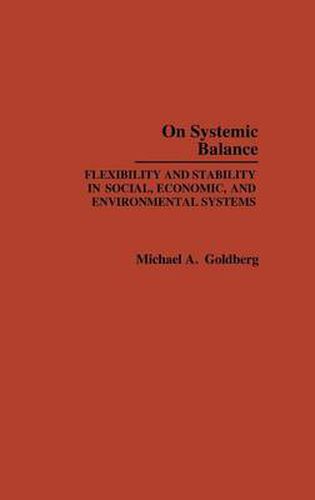Readings Newsletter
Become a Readings Member to make your shopping experience even easier.
Sign in or sign up for free!
You’re not far away from qualifying for FREE standard shipping within Australia
You’ve qualified for FREE standard shipping within Australia
The cart is loading…






Arguing that society has pursued short-run approaches to decision-making that in the long term are counterproductive, this book presents a multidimensional and interdisciplinary alternative to problem solving. The usual method of dealing with problems such as housing shortages and environmental protection is seen as simplistic and intrusive. This type of solution ultimately ignores the many interrelationships within a system. The long term effect is imbalance and destabilization. The author reinforces his argument with economic and environmental examples. He then introduces alternative approaches to decision making and applies them to several settings. By stressing slow incremental intrusions, regard for interrelationships, and balance, the author suggests that we might redefine problems more appropriately, develop less harmful and more enduring solutions, and provide a more stable environment. Goldberg maintains that we cannot truly predict the consequences of our actions, particularly large-scale actions taken over a short period of time. He presents his argument first by equipping the reader with a set of multidisciplinary tools and second by demonstrating the poor results of our present decision-making style. He then introduces an alternative approach which borrows from biology, economics, management and anthropology and applies it to three distinct settings.
$9.00 standard shipping within Australia
FREE standard shipping within Australia for orders over $100.00
Express & International shipping calculated at checkout
Arguing that society has pursued short-run approaches to decision-making that in the long term are counterproductive, this book presents a multidimensional and interdisciplinary alternative to problem solving. The usual method of dealing with problems such as housing shortages and environmental protection is seen as simplistic and intrusive. This type of solution ultimately ignores the many interrelationships within a system. The long term effect is imbalance and destabilization. The author reinforces his argument with economic and environmental examples. He then introduces alternative approaches to decision making and applies them to several settings. By stressing slow incremental intrusions, regard for interrelationships, and balance, the author suggests that we might redefine problems more appropriately, develop less harmful and more enduring solutions, and provide a more stable environment. Goldberg maintains that we cannot truly predict the consequences of our actions, particularly large-scale actions taken over a short period of time. He presents his argument first by equipping the reader with a set of multidisciplinary tools and second by demonstrating the poor results of our present decision-making style. He then introduces an alternative approach which borrows from biology, economics, management and anthropology and applies it to three distinct settings.